German Blitzkrieg in Yugoslavia
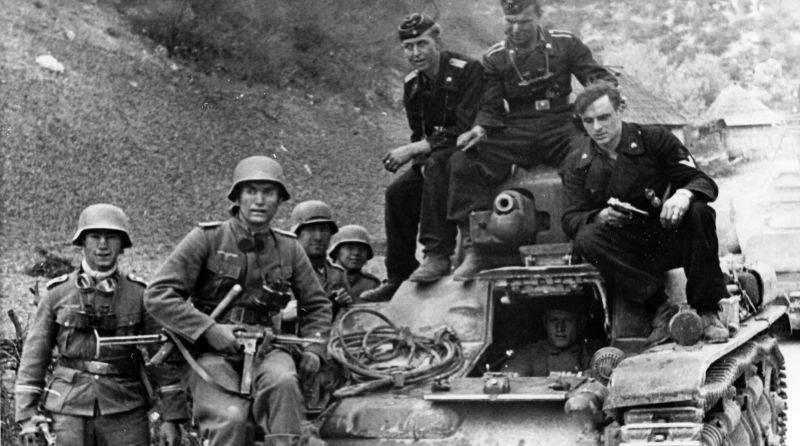
Wehrmacht soldiers on the armor of the captured Yugoslav tank Renault R35. Sarajevo area. April 1941
Strategic vulnerability of Yugoslavia
The strategic position of Yugoslavia in connection with the entry of German troops into Bulgaria became extremely unfavorable. In the north and east (Austria, Hungary, Romania and Bulgaria) there were German troops and armies allied to the Reich (Hungary). Greece, which bordered Yugoslavia in the south, was at war with Italy. From the western direction Italian troops could threaten.
Churchill suggested that Belgrade immediately and preemptively strike Albania. Thus, the Yugoslavs could eliminate the Italian threat in the rear, join forces with the Greeks, seize rich trophies and somewhat improve the operational position to fight Germany. However, Simovich's cabinet did not realize that the war was on the verge, and did not want to provoke a conflict with Hitler.
During the First World War, the Serbs showed themselves to be excellent warriors. However, the Yugoslav army was not ready for war. Its number reached 1 million people, but the general mobilization began already during the war and was not completed. About a third of the conscripts did not have time to appear at the recruiting centers, or did not come (in Croatia). Most of the divisions and regiments did not have full staff and did not manage to occupy the concentration areas in accordance with the defense plan.
The General Staff planned to wage a war from defense and deploy three army groups: 1st Army Group (4th and 7th armies) - defense of the northwestern direction, Croatia; 2nd Army Group (1st, 2nd and 6th Armies) - northeastern direction, border with Hungary and Romania, defense of the capital region; 3rd Army Group (3rd and 5th Armies) - southern part of the country, defense of the border with Albania and Bulgaria. Each army consisted of several divisions, that is, it was, rather, an army corps. In service there were more than 400 aircraft (half outdated), more than 100 tanks (mostly outdated and light). The anti-tank and air defense was extremely weak.
After the Belgrade coup, Hitler immediately held a military conference. He said that the attack on Russia would have to be postponed. Yugoslavia is now viewed as an enemy and must be defeated as quickly as possible. To inflict concentric strikes from the Fiume, Graz area and from the Sofia area in the direction of Belgrade and to the south, destroy the Yugoslav armed forces. Cut off the southern part of the country and use it as a springboard for an attack on Greece. The Air Force was to destroy Yugoslav airfields and the capital with continuous day and night bombing. The ground forces, whenever possible, began an operation against Greece with the task of capturing the area of Thessaloniki and advancing to Olympus.
The offensive from Bulgaria, north of Sofia, was carried out by a larger group to the north-west, towards Nis - Belgrade, the rest of the forces - from the area south of Sofia (Kyustendil) to Skopje. For this operation, all the troops in Romania and Bulgaria were used. To protect the oil fields of Romania, only one division and air defense forces were left. The Turkish border was covered by Bulgarian troops; if necessary, one German tank division could support them. For the development of the offensive through the southern part of Yugoslavia, the troops had to be regrouped and reinforced, and some of the divisions had to be transferred by rail. Therefore, the beginning of the operation was postponed for several days.
After the German plans were approved, the Fuhrer, in a letter to Mussolini on the evening of March 27, 1941, announced that he was expecting help from Italy. At the same time, he "warmly asked" not to undertake operations from Albania and with all available forces to cover the most important passages on the Yugoslav-Albanian border in order to prevent possible complications. He also proposed to strengthen the grouping of troops on the Yugoslav-Italian border as soon as possible. The Italian Duce replied that he had given an order to stop offensive operations in Albania, and that 6 divisions would be transferred to the eastern border, where there were already 7 divisions.
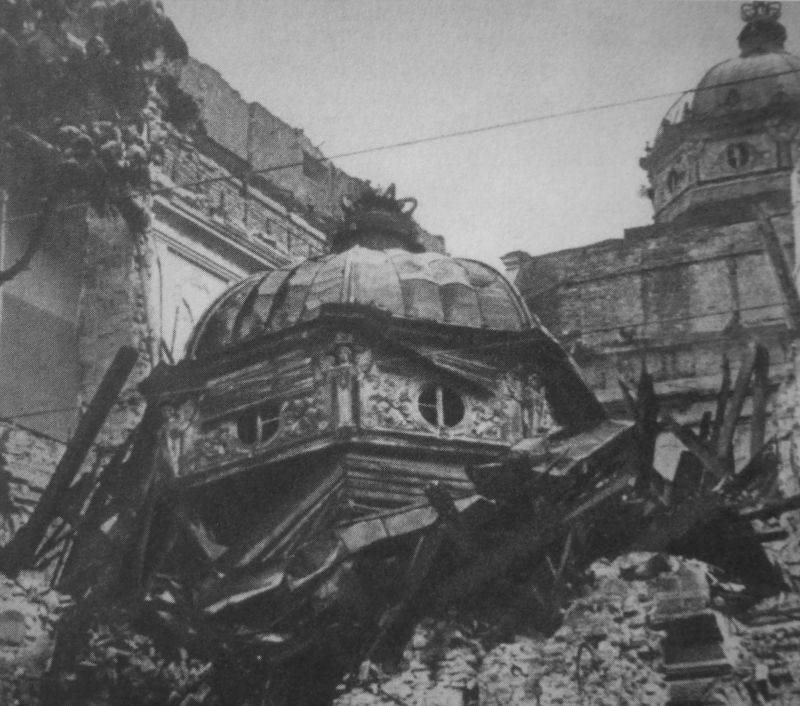
Royal Palace ("Old Courtyard") in Belgrade, destroyed by German aerial bombs
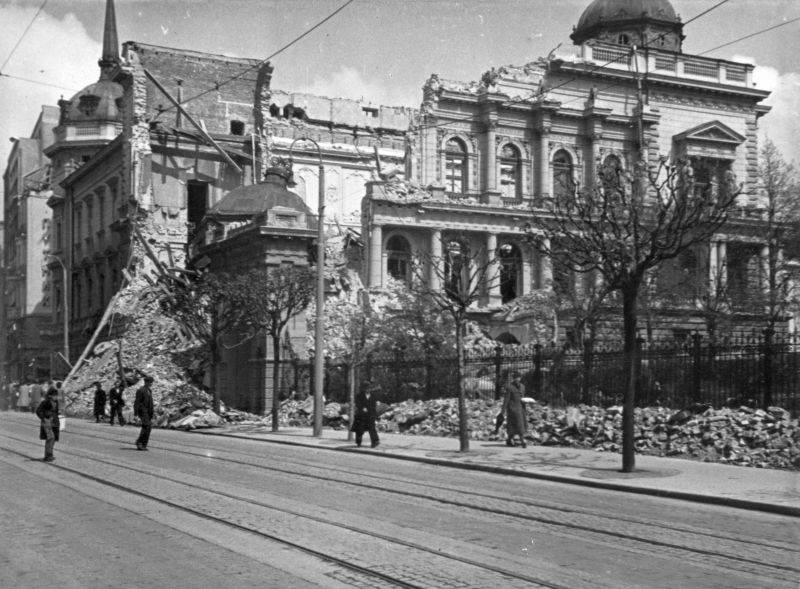
Passers-by at the royal palace destroyed by German bombing in Belgrade
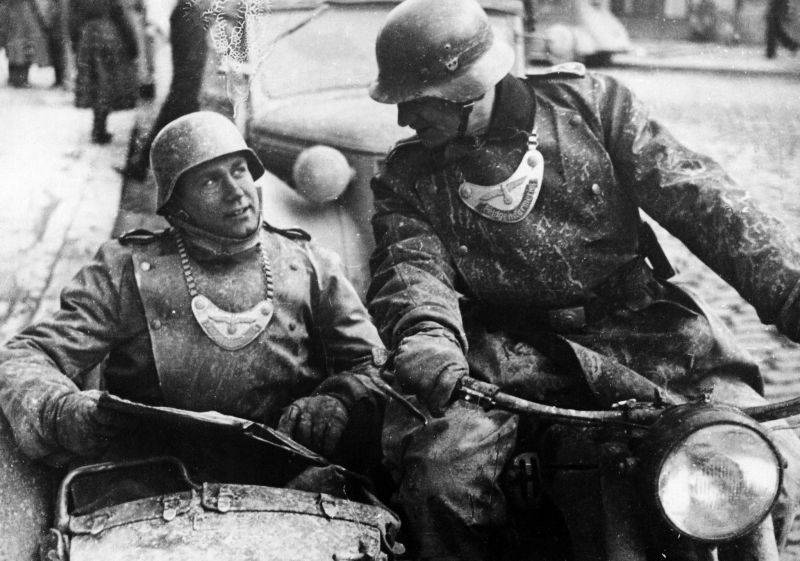
Motorcyclists of the Wehrmacht field gendarmerie, one of the first to enter Belgrade
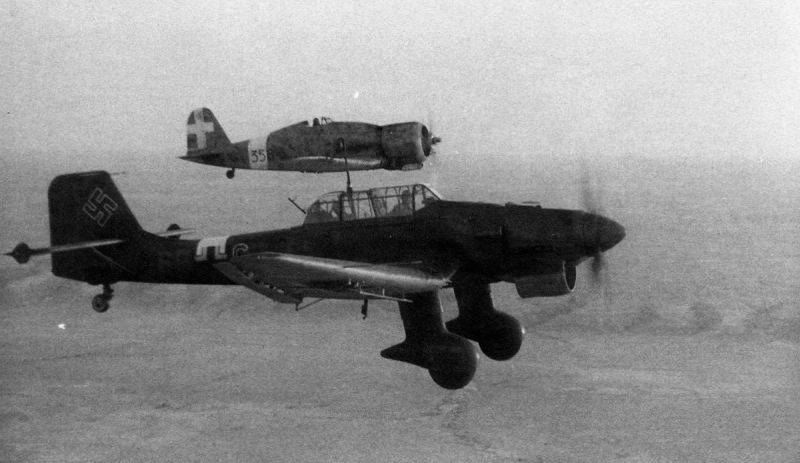
German dive bomber Ju-87 flies accompanied by Italian fighter G. 50 "Freccia"
The beginning of the disaster
On April 6, 1941, Berlin announced that German troops had entered Greece and Yugoslavia to drive the British out of Europe.
The Germans accused Athens and Belgrade of having committed a number of acts hostile to Germany. A criminal conspiratorial clique is allegedly operating in Yugoslavia, and Greece has allowed Britain to create a new front in Europe. Now the patience of the Reich is over, and the British will be expelled. Italy, which was already at war with Greece, joined the war between the Germans and Yugoslavia.
The Yugoslav command planned to defend itself in the north and east and, in cooperation with the Greeks, defeat the Italians in Albania. This was the wrong decision. From a military-strategic point of view, the Yugoslavs could drag out the war and create a united front with the Greeks and British in the only way. Leave most of the country, including the capital and major cities, and withdraw troops to the south, southwest. Unite with the Greek army, fight in remote mountainous areas. However, such a difficult decision turned out to be unacceptable for the Yugoslav elite. In Belgrade, a different decision was made, which led to the almost instant defeat of the armed forces and the fall of the country. And the losses of the Wehrmacht during the campaign were minimal (less than 600 people).
On the night of April 5-6, 1941, German reconnaissance and sabotage groups crossed the Yugoslav border, attacking border guards, capturing important points and bridges. Early in the morning, aircraft of the 4th Air Force began their attacks. fleet Luftwaffe. 150 bombers, under the cover of fighters, attacked the Yugoslav capital. Also, the Germans bombed the most important airfields in the areas of Skopje, Kumanov, Niš, Zagreb and Ljubljana. Also, the Germans bombed communication centers, communications, disrupting the deployment of the Yugoslav army.
The Yugoslavs were able to shoot down several German aircraft, but lost dozens of vehicles in the air and on the ground. In general, the Yugoslav Air Force was disorganized and lost its combat effectiveness. The German Air Force rampaged over the Serbian capital for several days. There was no air defense in Belgrade, German bombers were flying at low altitude. They left behind heaps of ruins and 17 thousand dead, even more wounded, crippled.
Dozens of Italian aircraft also took part in the attacks. The Italian fleet blocked the coast of Yugoslavia. On April 7, the Italian 2nd Army launched an offensive against Ljubljana and along the coast. The 9th Italian Army in Albania was concentrated on the Yugoslav border, creating a threat of invasion, and did not allow the Yugoslav command to remove some of the troops from this direction and transfer them against the Germans.
On April 5, List's 12th army completed the regrouping and on the 6th began hostilities simultaneously against Greece and Yugoslavia. Its divisions in three places crossed the border of Bulgaria and began to move towards the Vardar River. On the southern flank, mobile units advancing along the Strumitsa River valley reached Lake Doiran and turned towards Thessaloniki to strike on the western flank of the Greek East Macedonian army. One infantry division advanced to the river. Vardar, on April 7, mobile units occupied an important communications center of Skopje. As a result, within two days, the troops of the 3rd Yugoslav Special Army were dispersed and operational freedom was ensured for the divisions that operated against Greece. And Yugoslavia lost the ability to withdraw the army to the south to unite with the Greeks.
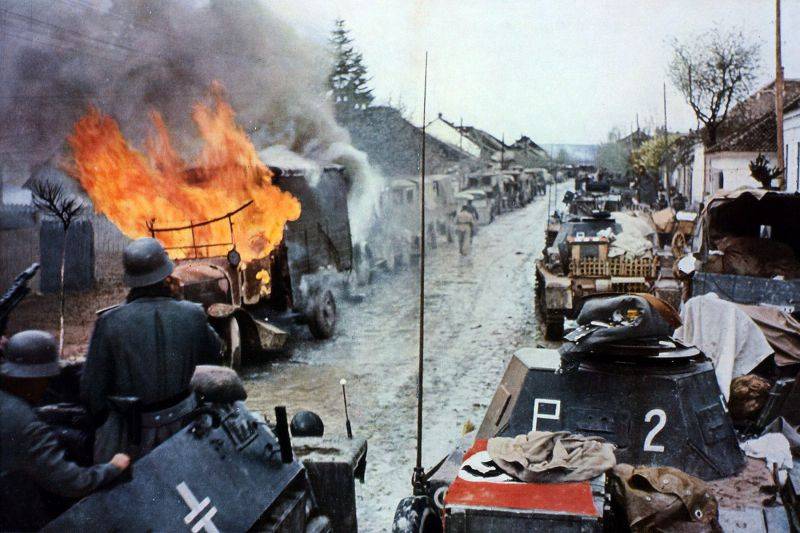
German armored personnel carrier Sd.Kfz.251 of the 14th Army Corps drives past a column of Pz.Kpfw II tanks and a burning truck in the Yugoslav city of Nis. April 9, 1941
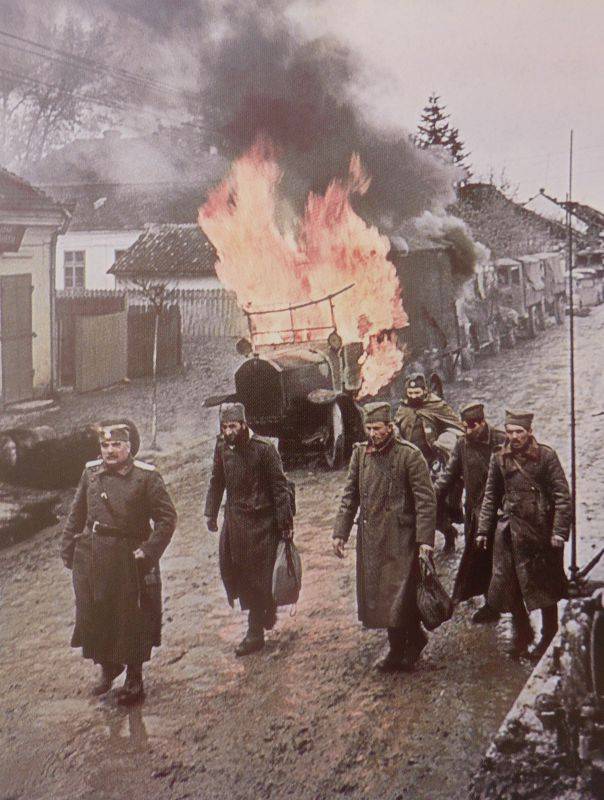
Yugoslavian prisoners of war pass next to a burning truck on a street in Niš. The photo was taken from the armored vehicles of the 14th corps.
The collapse and death of the army
At that time, only local operations were carried out on the remaining sectors of the front, since the 2nd German Army had not yet completed its deployment.
On April 8, 1941, the second stage of the offensive began. The decisive battles took place first in three areas: in the south - in the Skopje region, on the eastern border and in the northwest. In the south, mobile units turned west of Lake Doiran to Thessaloniki. The troops advancing in the valley of the river. Bregalnica and Skopje, sent one panzer division also south, to Prilep. On April 10, the Germans established contact with the Italians at Lake Ohrid. Then they moved to the west north of Lake Ohrid in order to alleviate the position of the Italian army, which, under the onslaught of the Yugoslav troops, gradually retreated across the Drin River. Other troops, which turned north from Skopje, met strong resistance from the enemy and could not break him until the end of the campaign.
On the other hand, the attack of the 1st Panzer Group of Kleist, advancing from the area southwest of Sofia against the southern flank of the 5th Yugoslav Army, was crowned with complete success. The Nazis attacked on both sides of the Sofia-Niš railway, with the effective support of large artillery and aviation... The offensive developed rapidly, on the very first day the Germans broke through the Yugoslav defenses. The Yugoslav command began to withdraw troops beyond the river. Morava, but this plan was not fully implemented. On April 9, the Nazis broke into Nis and developed a breakthrough northward along the Morava Valley, to Belgrade. Part of the troops turned south-west, towards Pristina.
The 1st Panzer Group acted quickly and boldly, the Germans passed through the valley of the river within three days. Morava through the thick of the Yugoslav troops, which partly retreated beyond the Morava, and partly were still located east of the river. On the evening of April 11, German tanks reached Belgrade from the southeast. Here the Nazis ran into the southern flank of the retreating 6th Yugoslav Army and crushed it. On April 12, German mobile units were stationed at the heights south of Belgrade. The 5th and 6th Yugoslav armies, the front of which had been broken through, were so disorganized and demoralized that they could not organize resistance on new lines, detain the German mobile formations that had separated from the infantry divisions, and intercept their communications in the Nis-Belgorod sector.
The rapid decomposition of the Yugoslav troops began, the Serbs still resisted, and the Croats, Macedonians and Slovenes added weapon... In Croatia and Slovenia, local nationalists sided with the Germans. On April 11, Hungarian troops launched an offensive, and the Italians occupied Ljubljana. On April 13, the Hungarians occupied Novi Sad.
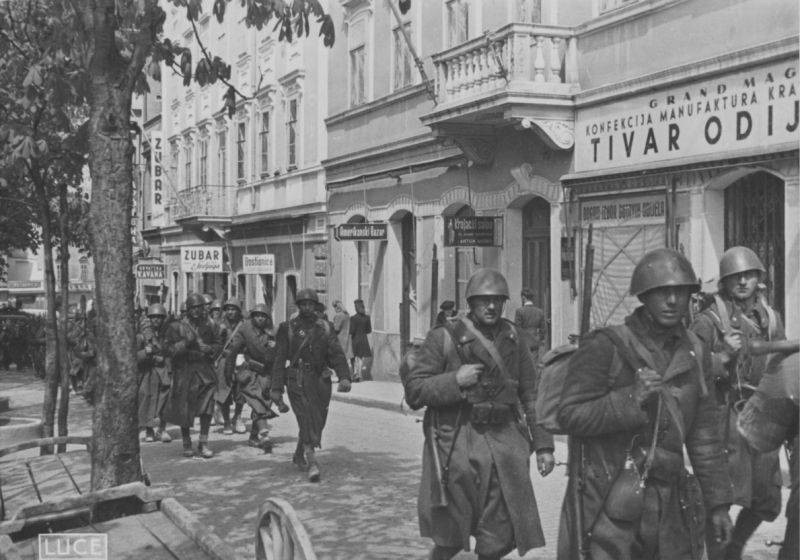
Column of Italian soldiers on the march along the street of the Yugoslav city
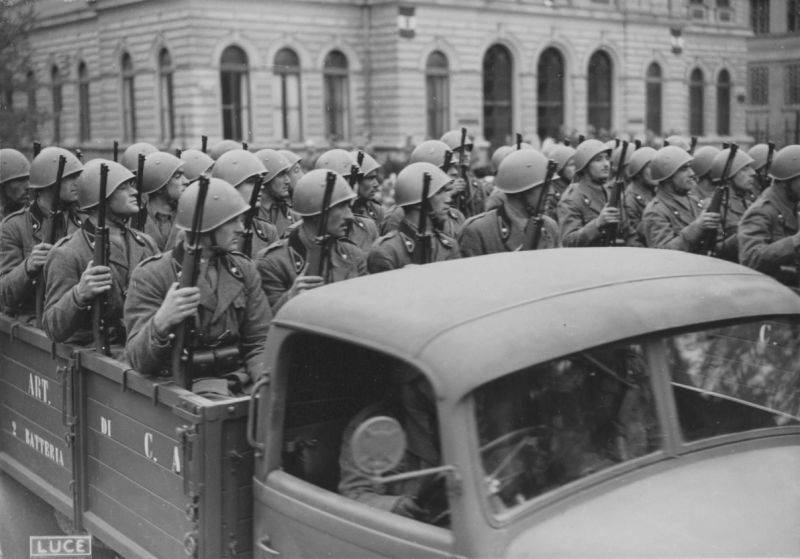
Italian soldiers armed with 6,5mm Moschetto per Cavalleria M1891 carbines in truck bodies during a parade in Belgrade
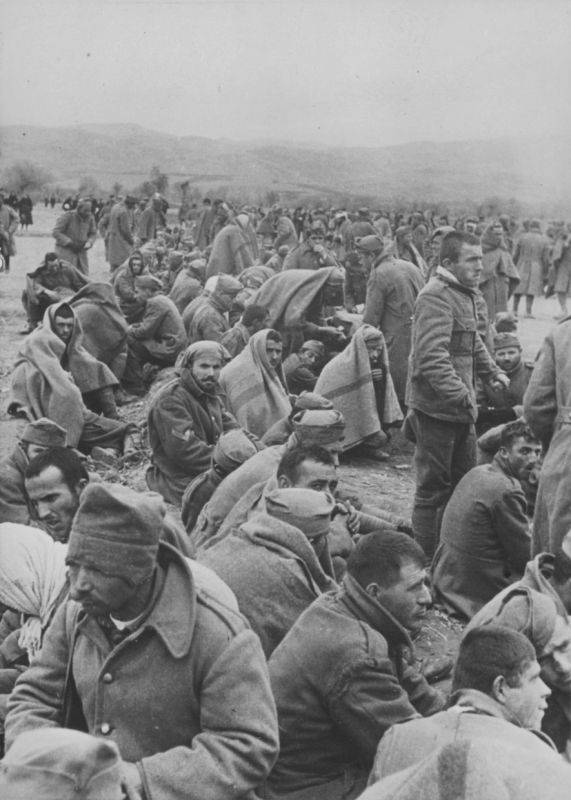
Yugoslavian prisoners of war at the assembly point
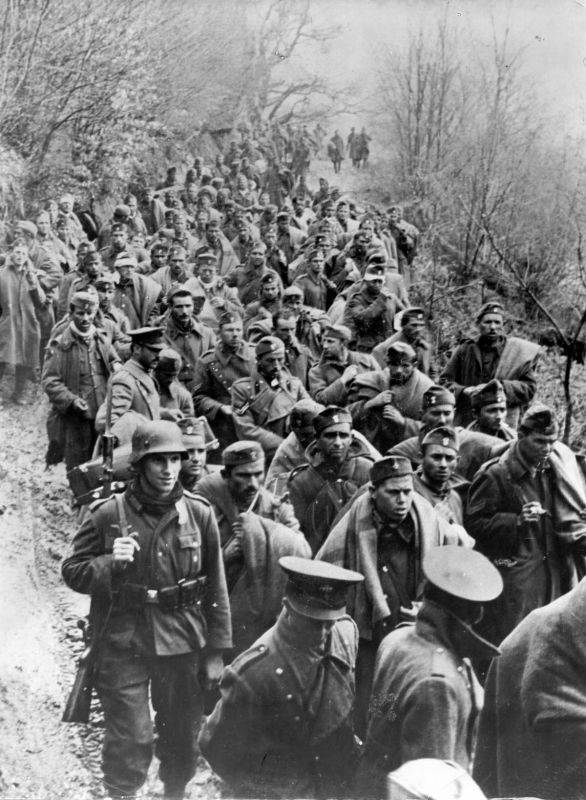
A column of Yugoslav prisoners on a march along a mountain road
Fall of Belgrade
Weichs' 2nd Army, deployed in Austria and Hungary, occupied the lands located north of the Drava River. Then the western flank of the 2nd Army advanced south. The 46th Motorized Corps, located in Hungary, with a bold attack captured the bridge over the Drava in the Barch region and created a foothold for a further breakthrough. After that, one panzer division went southwest to Zagreb, and two other divisions (panzer and motorized) to Belgrade.
These attacks were enough to cause panic and collapse in parts of the 4th and 7th Yugoslav armies, formed mainly from Croats. In some places, revolts of Croatian nationalists began. On April 10, they revolted in Zagreb and helped the 46th Corps take the city. Croats announced the creation of an independent state. This contributed to the disorganization and collapse of the coordinated resistance of the Yugoslav army in Croatia and Slovakia.
While Kleist's tanks were stationed south of Belgrade, the advance detachments of the mobile formation from the 2nd Army on the evening of April 12 reached the Serbian capital from the northwest. On April 13, the Nazis occupied the Serbian capital without a fight. From Zagreb and Belgrade, the Germans launched an offensive to the south.
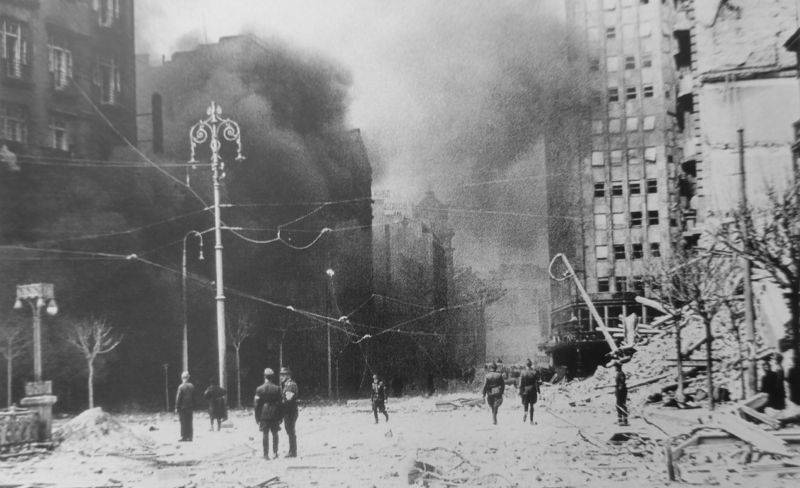
Burning house on Terazije Square in Belgrade after a German air raid
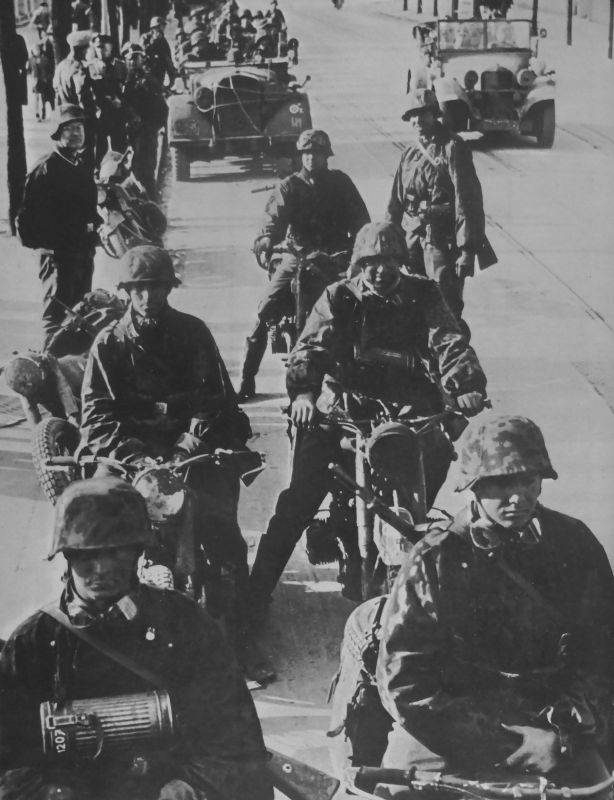
Motorcyclists of the motorized SS division "Reich" on a street in Belgrade
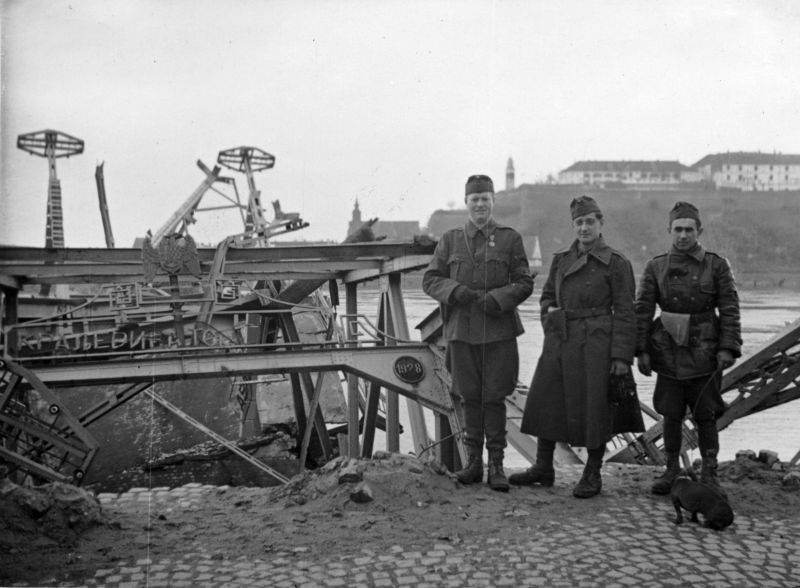
Hungarian soldiers at the destroyed road bridge over the Danube River in the Yugoslav city of Novi Sad. The Petrovaradin Fortress is visible in the background
Country pogrom
The Yugoslav command, after the loss of Croatia, the Skopje and Nis area, hoped to hold at least one key area, which in the south covered the region of Kosovo and Metohija, in the east it was bounded by the Morava and Belgrade rivers, in the north by the Sava river. In this area, the Yugoslav army was to give a decisive battle. However, this plan could not be carried out. In connection with the rapid advance of the enemy, the collapse of the entire defense, the collapse of the armed forces, some of which began to go over to the side of the Germans.
The German command did not give the enemy time to recover, create new lines of defense, or even retreat in an orderly manner. The remnants of the 4th and 7th Yugoslav armies withdrew to the southeast across the river Una. To pursue them in the direction of Sarajevo from Zagreb, a tank division was advanced. The troops of the second echelon of the 2nd German army pressed the remnants of the 2nd Yugoslav army across the Sava river. In the area west of Belgrade, the 46th corps on the evening of April 13 turned to Sarajevo and dealt a deep blow to the flank and rear of the 6th Yugoslav Army, which retreated from the eastern border and took up defenses south of Belgrade with a front to the east. The battles east of the Morava River also ended. Moving from the Nis - Belgrade line to the west and southwest, the Nazis finished off the retreating troops of the 5th Yugoslav Army.
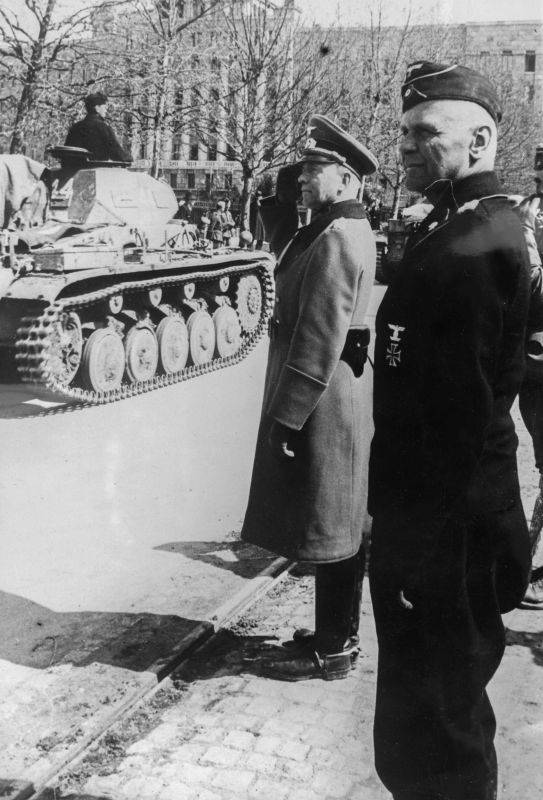
The commander of the 1st Panzer Group of the Wehrmacht, Colonel-General Ewald von Kleist, takes a parade of German troops in Belgrade. April 14, 1941
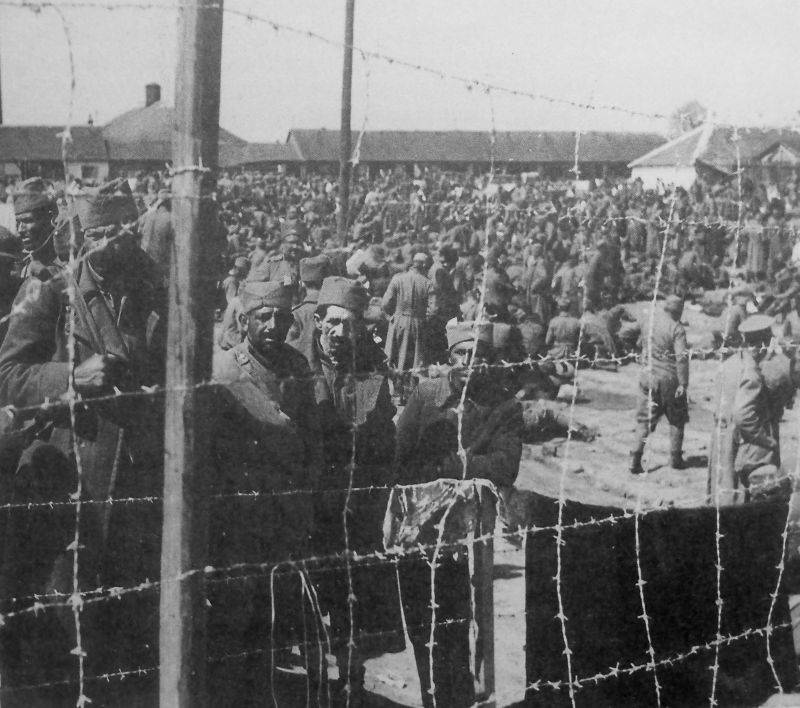
Yugoslav prisoners of war in a camp near Belgrade
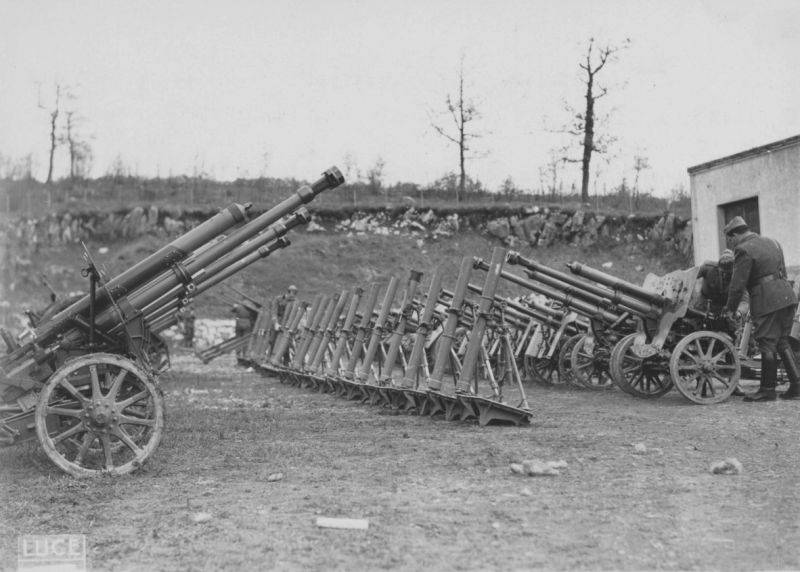
Two Italian officers inspect captured Czech-made 47mm Yugoslavian cannons. In the center of the photo - Brandt's 81-mm mortars
On April 15, German divisions occupied Yayce, Kraljevo and Sarajevo. It was a complete disaster.
The head of government, General Simovic, resigned on April 14 and flew to Athens with his family on the 15th, and from there to London. The government and the king also left the country. Simovich transferred the powers of the commander-in-chief to the head of the General Staff Kalafatovich. The general was empowered to negotiate peace. Kalafatovich immediately began negotiations with Weichs and received an answer that it could only be a complete surrender.
April 17 at 9 a.m. Kalafatovich gave the order to surrender the army. This order, with some time difference, was carried out everywhere. On the same day, an armistice agreement was signed in Belgrade, which provided for unconditional surrender and entered into force on April 30.
Meanwhile, the Germans and Italians continued to move, occupying the entire country. On April 17, the Italian army occupied Dubrovnik.
During the campaign, the Yugoslav army lost about 5 thousand people killed, over 340 thousand soldiers surrendered. Another 30 thousand surrendered to the Italians. These figures show that the country and the people were not ready for war. The resistance level was low. The Serbs began the real struggle after the occupation.
Thus, the Kingdom of Yugoslavia ceased to exist.
Its territories were divided. Germany received Northern Slovenia; Italy - South Slovenia and Dalmatia; Italian Albania - Kosovo and Metohija, West Macedonia and part of Montenegro; Bulgaria - North Macedonia, eastern regions of Serbia; Hungary - Vojvodina, northeastern Slovenia. The Independent State of Croatia (Croatia, Bosnia and Herzegovina, part of Slovenia) was formed, ruled by the Nazis-Ustashi, oriented towards Hitler; Kingdom of Montenegro - Italian protectorate; and the Republic of Serbia under the control of the German military (it included the central part of Serbia and the eastern Banat). Serbia became a raw material appendage of the Third Reich.
- Alexander Samsonov
- http://waralbum.ru/
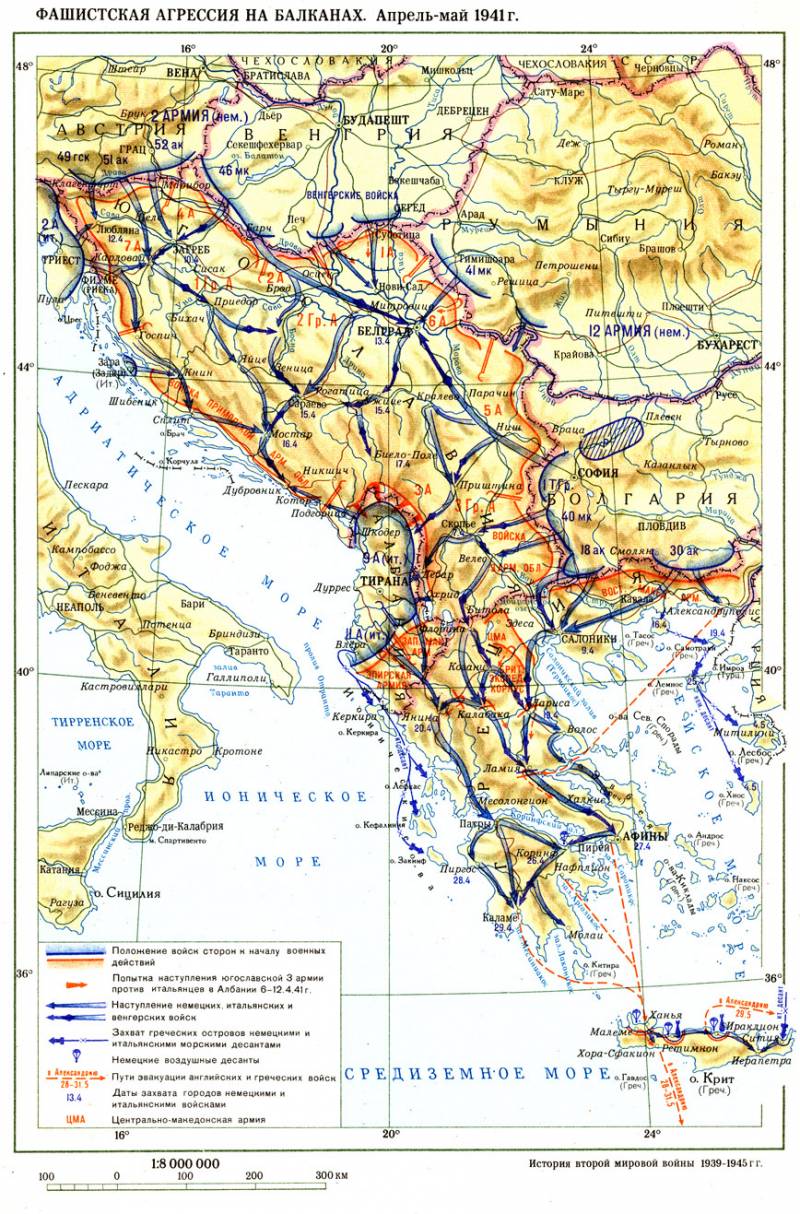
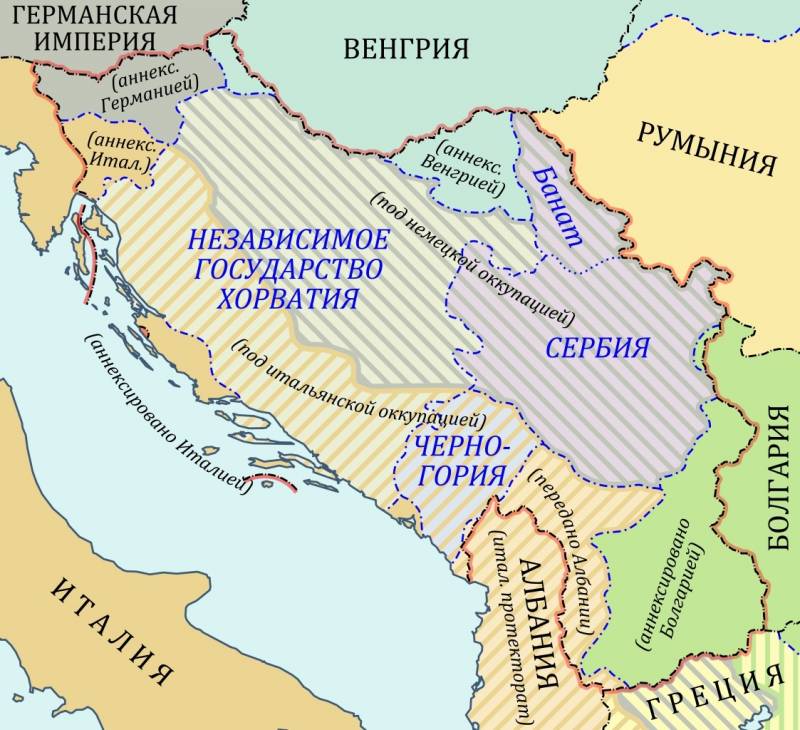
Information